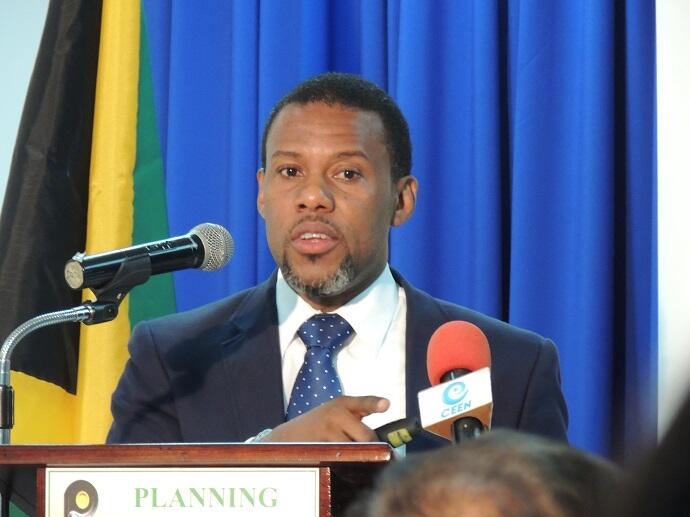Executive Director, Caribbean Disaster Emergency Management Agency (CDEMA), Mr. Ronald Jackson, says that although the Caribbean is one of the most hazard- prone regions of the world there are steps that can be taken to prevent the hazard impacts from becoming disasters and minimize the level of human losses. The key to achieving this, he opined is reducing the vulnerabilities of those most at risk. These include infants, persons living with disabilities, the elderly, pregnant women and persons with chronic diseases resulting in decreased mobility.
“The occurrence of a hazard, whether natural or man-made, does not automatically result in a disaster. Rather it is the combination of an exposed, vulnerable and ill-prepared population with limited capacity to cope combined with a hazard event that results in disaster,” he told those gathered. He cited Haiti and Chile which both experienced earthquakes in 2010 and suggested that Chile fared better because of investments made in disaster mitigation.
“Chile is a much wealthier country which applies and enforces strict building codes, has a robust emergency response system and a long history of handling seismic catastrophes. Because of this high level of experience with earthquakes, Chileans have homes and offices built to ride out quakes, their steel skeletons designed to sway with seismic waves rather than resist them. Haiti by contrast, had no building codes and most of its citizens were not familiar with the appropriate actions to take in the event of an earthquake to minimize injuries,” he noted.
Against the background of an estimated economic loss of US$38 billion to the Caribbean region for the period 2010-2012 and an impact on over 15 million people, caused by hurricanes, tropical storms, local storms and flooding as reported by the Caribbean Development Bank, Mr. Jackson called for greater prioritization of the natural environment through adequate budgetary allocations and the effective enforcement of legislation to reduce the level of vulnerability. He also stressed the importance of involving representatives of vulnerable groups in the revision and updating of disaster plans; and to ensure appropriate communication with the affected groups.
Addressing the practices to incorporate the needs of vulnerable groups in disaster mitigation, preparedness and response plans, Mr Jackson pointed to the work of CDEMA, which he said, had established a Community Response Team (CERT) programme to allow communities to become more self-reliant during emergency events. “CERT is designed to help individuals protect themselves, family, neighbours and neighbourhoods in emergency situations and thereby reduces the vulnerability at the community level. He also mentioned that CDEMA had initiated the process of gender mainstreaming in disaster management through the establishment of a Gender Working Group. In addition, he said that CDEMA is currently working with the United Nations Development Programme (UNDP) Barbados and the OECS to strengthen the capacity of the CDEMA participating states to gather and analyse gender sensitive data to contribute towards the development of disaster management policies that are gender sensitive. Research and experiences around the world he stated, reveal that disasters highlight and reinforce inequalities in societies, including those that are gender related. Between 22 and 44 per cent of households in the CARICOM are headed by women, disasters he added “can result in the reduction of women’s share of productive activities in the informal sectors, through direct damages to their means of production like small farms or equipment associated with micro-business.”
He cautioned that preventing hazard impacts from becoming disasters requires involvement from all sectors, not just those in disaster management.
Given the Caribbean region’s high vulnerability to natural hazards and in keeping with the theme for this year’s observance of World Population Day, Vulnerable Populations in Emergencies, the UNFPA Sub-regional Office for the Caribbean in association with national partners, the Planning Institute of Jamaica (PIOJ) and the Office of Disaster Preparedness and Emergency Management (ODPEM) staged a Public Lecture to heighten awareness around the theme. This took place at the PIOJ on July 9.
Director General, Planning Institute of Jamaica, Collin Bullock who also addressed the gathering, said it is important to differentiate the needs of vulnerable populations in emergencies, and to understand the role and potential of each group in emergency management. “A first step, I suggest, is to improve our data management practices through more consistent collection of disaggregated data and use of such data to inform decision making. A second would be a communications programme to sensitize the entire population about the different sources of disaster-related emergencies. This should help us to understand that disasters transcend hurricanes and put us in a better position to respond.”
“Drawing attention to these specific groups helps to ensure that their needs including women and girls’ rights to sexual and reproductive health are met and their vulnerability to violence is tackled,” said Sheila Roseau, Director, UNFPA Caribbean Sub-regional Office. “We need to preserve the dignity, safety and reproductive health of all women and girls at all times,” she stated.



